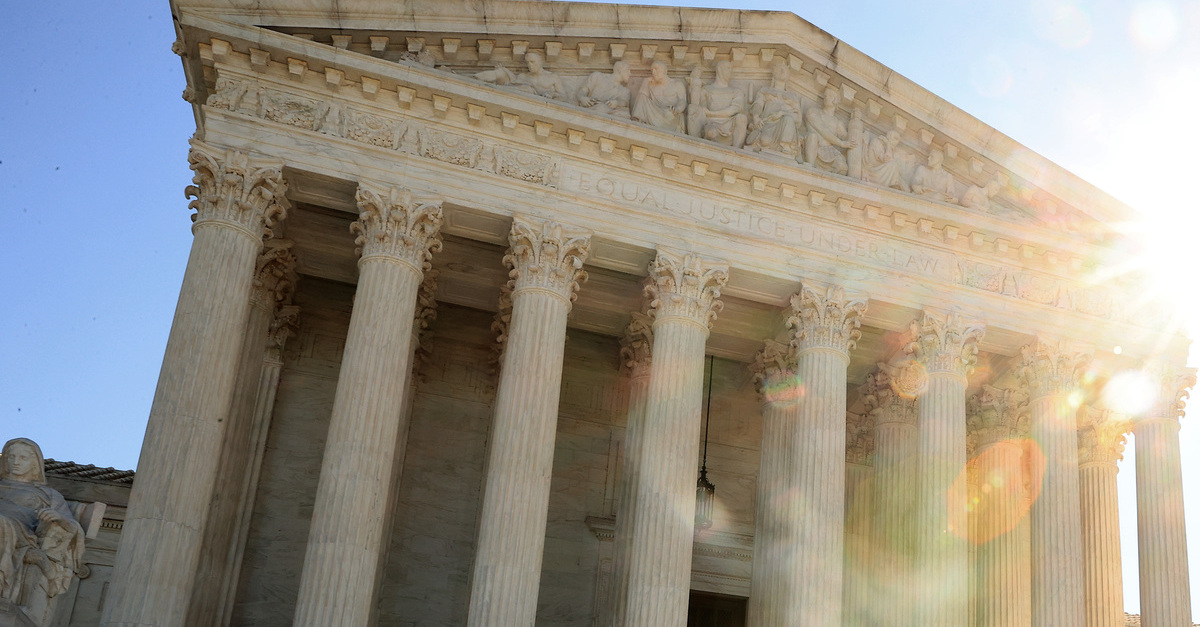
The sun shines on the Supreme Court building in Washington D.C.
After the Supreme Court resumes following Martin Luther King Day, the justices will hear arguments over a religious liberty case transcending usual political boundaries and a decades-old dispute over Nazi-looted artwork.
First, in Shurtleff v. Boston, the high court will consider whether the City of Boston should have to fly a conservative Christian group’s religious flag outside City Hall. Immediately thereafter, the justices will hear Cassirer v. Thyssen-Bornemisza Collection Foundation, a dispute over a Nazi-confiscated impressionist painting long thought destroyed.
Shurtleff v. Boston
A conservative Christian group called Camp Constitution sued the City of Boston over its refusal to fly the group’s flag — and the Biden administration sides with the conservative plaintiffs.
Three flags fly outside Boston’s City Hall in an area specifically designated as a “public forum.” One is the U.S. flag. One is the Massachusetts state flag, and the third rotates among various flags. Private groups are encouraged to apply to temporarily include their own flag for the express purpose of “foster[ing] diversity and build[ing] connections among Boston’s many communities.”
In fact, 284 flag raisings have been allowed over 12 years, with no groups being denied permission. These flags have varied widely and have included ethnic and gay pride flags, as well as those that commemorate Juneteenth and the Battle of Bunker Hill. The lone denial went to Camp Constitution and their flag bearing a Latin cross.
This is the picture of the proposed flag Camp Christian included in its petition for certiorari:
Camp Christian’s proposed flag.
Camp Christian’s official mission is to “enhance understanding of the country’s Judeo-Christian heritage, the American heritage of courage and ingenuity, the genius of the United States Constitution, and free enterprise.”
According to the petition for certiorari, Boston denied Camp Constitution’s request to fly its flag because the city “maintains a policy and practice of respectfully refraining from flying non-secular flags on the City Hall flagpoles.” Although the idea of a public entity refraining from making religious statements is nothing new, the case presents something of a legal conundrum under the First Amendment: when a flag is flown at City Hall at the request of a private group, whose flag is it—the group’s or the city’s?
The distinction between government’s own speech and private speech is an important one because each triggers different analyses under the First Amendment. If Camp Constitution is the official flyer of the flag, it means Boston would be legally required to allow all other proposed flags as well so as to avoid content-based discrimination.
In his piece, “The Christian right brings a Supreme Court case it actually deserves to win,” Vox‘s Ian Millheiser predicts that the Shurtleff plaintiffs will prevail due to the Court’s recent tendency to favor religious conservatives. Millheiser notes, though, that a ruling in Camp Constitution’s favor could mean that “Boston would be unable to exclude a Nazi group from flying a flag for as long as the flagpole is available to people with other viewpoints.”
Alternatively, if it’s the city itself flying the flag, a different problem is afoot: the potentially unconstitutional government establishment of religion.
A lengthy 70 minutes has been allotted for oral arguments in the case, which is on appeal from the U.S. Court of Appeals for the First Circuit, which sided with Boston.
Cassirer v. Thyssen-Bornemisza Collection Foundation
In this case, the justices will settle a procedural dispute that dictates the course of a decades-old lawsuit over the fate of an impressionist masterpiece stolen by Nazis during the Holocaust.
Lilly Cassirer inherited Camille Pissarro’s Rue Saint-Honoré, Afternoon, Rain Effect from a family member in 1926.
However, Cassirer was forced to turn the painting over to the Nazis in 1939 in exchange for permission to flee Germany. Cassirer sought safety in the U.S., and in 1954, the U.S. Court of Restitution declared her the true owner of the painting (which is now estimated as being worth approximately $40 million). Cassirer received $13,000 in compensation from the German Federal Republic in 1958, at a time when all parties believed the painting to be lost.
In actuality, the painting had traveled to the U.S. and was acquired by a California gallery owner in 1951. The Pissarro made its way around the U.S. for years, later ending up in Switzerland and finally, in the Thyssen-Bornemisza Museum in Madrid. Along the way, those who bought and sold the painting failed to investigate its provenance.
Lilly’s grandson Claude Cassirer, who died in 2010, remembered playing in a room as a child while the Pissarro hung on the wall. After searching for and locating the painting, Claude started legal action in 2005 to recover it for his family. That lawsuit now enters a third generation as Claude’s grandson David Cassirer now continues the battle against the museum.
The justices will not rule on the painting’s ultimate ownership, but rather on which is the proper law applied to this multi-locational lawsuit. These complex choice-of-law questions, known in legal circles as “Erie Questions,” are among the most complex procedural determinations in American civil law.
The difficulty lies not only in the question of American versus European law, but also in the fact that the Cassirer’s raise state (as opposed to federal) claims while proceeding in federal court. The Biden administration filed an amicus brief supporting the Cassirers’ position.
This is not the first time in recent memory when the justices have considered artwork stolen by Nazis. In 2020, the high court unanimously ruled against families of Holocaust survivors, finding that U.S. federal court was not the correct forum to adjudicate the cases. Although Cassirer v. Thyssen-Bornemisza Collection Foundation raises an entirely different set of facts, it still involves application of the Foreign Sovereign Immunities Act (FSIA).
The justices have also allotted extended argument time for this case.
[Image via Chip Somedevilla/Getty Images]